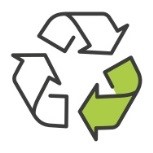Environmental sphere
| Environmental sphere | ||
|---|---|---|
 |
Support of export without negative environmental impacts |
The supported export is assessed as an export without negative environmental impacts |
|
Environmental policy within EGAP |
Saving energy and materials |
|
Support of export without a negative environmental impact 
EGAP follows the OECD Recommendation on Common Approaches for Officially Supported Export Credits, Environmental and Social Due Diligence (the "Common Approaches") in assessing the social and environmental impact of exports. The specific approach to a given assessment depends on the category (A, B, or C) in which the project is included.
Category A includes projects where irreversible and significant negative environmental impacts can be expected. These are exports falling within a so-called sensitive area (e.g. national parks, protected areas, wetlands, forests with a high level of biodiversity, and areas of archaeological or cultural interest).
When classifying an export as Category A, the exporter is required to submit an ESIA (Environmental and Social Impact Assessment) and an expert opinion with a clear assessment of the degree of environmental impact of the export in the country of the destination. The assessment must result in a clear opinion as to whether the export project complies with the environmental limits and criteria under the environmental rules. If the export under examination does not comply with these limits and criteria, EGAP requests that the technical parameters of the export be modified so that the limits and criteria for the sector concerned are met. ESIA reports and summary assessments are published on the exporter's and EGAP's websites.
Category B includes projects where less severe environmental impacts can be expected. Here, EGAP follows a similar procedure as in the case of the classification of exports in category A. For exports classified as Category B, the environmental impacts of the project are also assessed and are included in the ESIA or in the project's summary assessment. EGAP also publishes ESIAs or summary reports with an assessment of the environmental impact of the project in the country of the destination for Category B projects.
EGAP does not require an expert opinion from the exporter when the export is classified as Category C, which includes projects with minimal environmental impacts.
EGAP monitors the impacts of the main export projects supported as part of its responsible environmental approach. The vast majority of projects supported by EGAP fall into the category with minimal environmental and social impacts (Category C). For other projects (categories A and B), EGAP tries to mitigate potential negative impacts as much as possible within its activities, for example by setting up effective controls. The conditions of acceptability of the environmental and social impact of the project set out in the summary assessment for the project are reflected in the insurance contract with the exporter or financing bank.
Environmental policy within EGAP 
Energy and material savings
One of EGAP's environmental policy objectives is to reduce its ecological footprint. Therefore, EGAP is gradually working to save energy, e.g. by replacing boilers by boilers with higher combustion efficiency and gas boiler burners by low-emission burners with continuous control (this saves gas and reduces Nox emissions at the same time), introducing preheating of hot water with waste heat from building cooling, or lighting with LED bulbs. Energy savings are taken into account in all changes to the building equipment, from appliances to elevators, for instance..
Considerable attention is also paid to the efficient use of new technologies to enable a reduced environmental impact and, of course, to staff education in this sphere.
In order to reduce the environmental burden, EGAP also prefers electronic communication to paper and is working to further expand the use of biometric signatures. The relatively recent introduction and gradual expansion of the online system (see Chapter 2.1), which is saving on printing, is also contributing to a better economy.
Ecological transport is also an intensively addressed issue. EGAP's vehicle fleet was reduced to a minimum in the past and car sharing is largely used. In 2016, the fleet was renewed, and vehicles with lower fuel consumption than the previously owned fleet were acquired. EGAP is also currently analyzing the possibility of using electric cars or other electric vehicles. In addition, EGAP efficiently plans the business trips of its employees and uses public transport where possible. This also applies to employees' travel to work, where EGAP contributes to the cost of public transport. However, EGAP employees are also encouraged to use alternative forms of transport to work, whether it is walking to work, or transport by bicycle, scooter, skates, etc. EGAP offers secure storage facilities for bicycles and scooters on its premises, as well as facilities for personal hygiene and changing.
Sustainable waste management
EGAP promotes responsible and environmentally friendly waste management. For this reason, for example, it reduces printing, the consumption of plastic bottles, disposable cutlery, and tableware.
Sorting of waste for recycling is commonplace at EGAP, with special bins on each floor of the EGAP building for sorting plastic, paper, glass, and mixed waste.
Additional environmental projects
EGAP boasts around 100,000 bees, which reside in six hives on the roof of the export insurance company's headquarters in Vodičkova Street. By engaging these new colleagues, EGAP seeks to support the ecosystem of the capital city and contribute to its healthy development. The sweet spot is the production of their own honey.
In order to improve the working environment, EGAP promotes biophilia by introducing outdoor natural elements into the interior of the building. This includes the use of natural materials in the interior, flowers, and outdoor seating. EGAP grows herbs on the terrace, which can be used freely by employees or the kitchen.